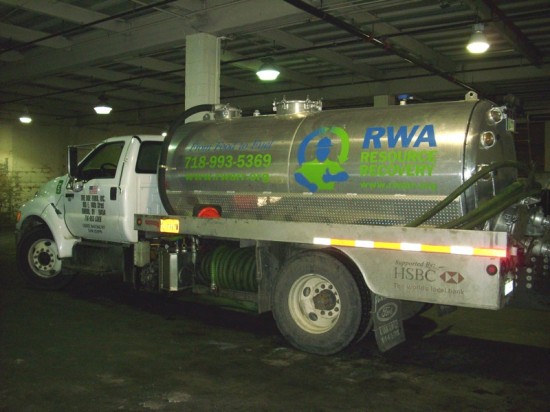
Will the smell of used oil foul the air, residents ask
A proposal that clean air advocates say will cut air pollution nationally has some Port Morris residents saying “Maybe so, but what about our air?”
They expressed concern about a proposal to store used cooking oil in a former garage on East 140th Street at a public forum in January.
Saying the new facility will bring jobs and help the environment, a non-profit organization that helps the homeless and former jail inmates get back on their feet, wants to store the oil, which would be recycled into diesel fuel.
The Manhattan-based Doe Fund, which trains jobless New Yorkers then puts them to work in catering, pest control and sanitation, would expand its training capacity to the new field of “yellow grease” recycling, picking up used cooking oil from restaurants and delis. The oil is mixed with standard diesel fuel for conversion into cleaner-burning biodiesel fuel at processing plants.
Proponents of the new recycling technology consider it a healthy alternative to petroleum-based diesel, because it is domestically produced, renewable, and limits the buildup of troublesome used cooking grease in sewer systems. It also cuts down on air pollution, since there’s less truck transport of the greasy goo to landfills, they contend.
But some advocates and area residents who attended the January forum expressed concern about what they fear are possible harmful effects on the neighborhood, saying the area is already saturated with polluting and odor-causing industries.
“To have something like this open up in this area again? It’s like a slap in our face,” said Alex Ruiz, who owns and lives in an apartment building around the corner from the facility.
City and state regulatory agencies are reviewing applications for permits that would allow the Doe Fund to install two 8,000-gallon containers in the former limousine, two blocks east of the Bruckner Expressway.
Port Morris is one of several neighborhoods around the city zoned to allow heavier industries such as waste transfer stations and recyclers to cluster.
Marian Feinberg of the advocacy organization For a Better Bronx said South Bronx neighborhoods have suffered from odors, despite assurances from offending industries. She pointed to the NYOFCo fertilizer plant in Hunts Point, which spread nauseating smells over a wide area for more than a decade before closing its doors last summer.
“This community has way more than its fair share,” said Feinberg. “This zoning is something this community has been upset about for a long time. We’d like to see it spread out a little bit.”
Ruiz agreed. “Everyone wants to come into this neighborhood, but there are residences here,” he said. He pointed to a waste transfer station on East 138th Street that promised to be odor-free before opening. The odors from the plant can be overpowering when the wind blows a certain way, Ruiz said.
Representatives of the Doe Fund, and of the engineering firm it has hired said the state and city’s rigorous permitting process should serve to reassure residents.
“Every imaginable scenario they’ve put in front of us and said, ‘How are you going to handle this?’” said Leslie Mesnick-Uretsky of AKRF, the engineering firm.
“We’re a different kind of business owner than others you’re used to in the neighborhood,” she added, citing the Doe Fund’s reputation as a helping hand in the city.
For now, the Doe Fund uses the garage to park its five trucks. Employees for the non-profit—all formerly homeless or incarcerated—pick up used cooking oil at area restaurants, then deliver it to two processing facilities, one in Hunts Point and another in Westchester County.
If the state and city provide the permits the group is seeking, they would instead truck the grease back to Port Morris, then would offload the viscous liquid into the containers through hoses. A tanker truck would pick up cooking oil in Port Morris and take it to a processing facility where it would be converted to diesel. Regulators would restrict pickups to one a day.
Wilhelm Ronda, the director of planning for the Bronx borough president’s office, told the forum the Bronx gets more contamination from industry than the other boroughs. He said his office would be vigilant about monitoring the plant.
Ronda, too, cited the controversial NYOFCo plant in Hunts Point, saying its unwillingness to hire trained technicians to curb the stink was at the heart of its problems.
“The community paid the price for that incompetence,” Ronda said.
There is value to the new grease recycling technology that can benefit communities, Ronda said, but added that the odor risks bear watching.
“The concept is a progressive one, but solid waste is a hard issue for Bronx County,” he said.
